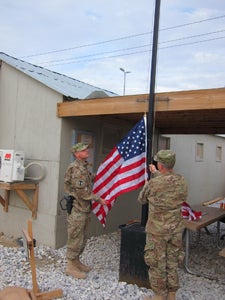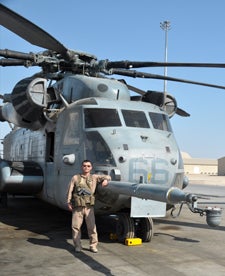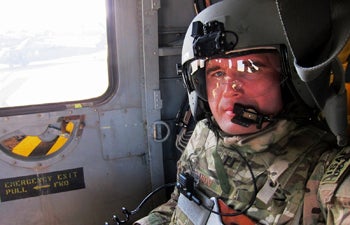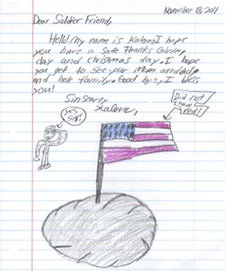Pledging Allegiance
It is tradition for military personnel to fly an American flag over the Pentagon, military hospitals, a forward operating base (FOB) or inside an aircraft during mission flights in honor of someone or something important to them.
For a Marine and an Air Force captain in Afghanistan, that something was their alma mater.
Marine helicopter pilot Capt. Brian “Domo” Gilbert, who earned his bachelor’s in international relations in 2005, affixed a flag inside the cabin in a CH-53E Super Stallion, which he flew during a combat mission over Helmand Province. The flag was signed by crewmembers, folded in the official manner and sent with a certificate to the USC Dornsife College Deans. It is displayed in the dean’s office suite.

Air Force Capt. Marat Zanov, a military clinical psychologist who earned his Ph.D. in psychology in 2009, (left) flew an American flag over his FOB in hostile territory near Kabul in honor of USC Dornsife. Photo courtesy of Marat Zanov.
“USC was one of the best experiences of my life,” Gilbert said. “I made lifelong friends as a member of the NROTC Trojan Battalion and as a student at the USC School of International Relations. I miss the tight-knit atmosphere and the football games.”
When he’s not serving overseas, Gilbert lives with his wife, Virginia, a chemical engineer, in San Diego, where he works at Marine Corps Air Station Miramar. It’s a two-hour drive to watch the Trojans play at the Los Angeles Memorial Coliseum.
“I’m excited about the upcoming football season and have already bought my season tickets,” Gilbert said from Camp Leatherneck, where he served his second tour from July 2011 to February 2012. He had previously been deployed to Iraq.
In Afghanistan, Gilbert transported troops and cargo, including food, water, ammunition and repair parts. The missions were harrowing in part because of the risk of brownout that occurs when the helicopter’s rotor wash kicks up the desert sand. Coupled with the night environment, the threat of brownout makes simple landings for offload of Marines and cargo extremely dangerous.
“Flying around Afghanistan is challenging, but also rewarding and exciting,” Gilbert said.
Helmand Province is primarily a desert with mountainous terrain to the north and one major water source, the Helmand River. From Gilbert’s perspective in the sky, Afghan life is extremely varied.
“I’ve observed families living in everything from mud huts to grand three-story homes,” he said. “In some areas, you can even see remnants of castles built by Alexander the Great. Every once in a while I’ll see someone herding sheep or a random caravan of camels.”

Marine pilot Capt. Brian “Domo” Gilbert stands in front of his helicopter in Afghanistan. Photo courtesy of Brian Gilbert.
Gilbert said his background in international relations has served him well in his military career.
“I chose international relations because I wanted to be armed with the knowledge and experience to discern the bigger picture of my actions as a military member,” Gilbert said. “Studying IR gave me a clearer understanding of different world views, and I felt that I could relate to why state actors made certain decisions.”
Steven Lamy, professor of international relations and vice dean for academic programs in USC Dornsife, remembered Gilbert sitting in the front row of his class, ready to answer any question Lamy threw out.
“Because of Brian’s level of interest and his commitment to learning, I got to know him very well and we talked a great deal about his planned military service,” Lamy said. “We have a large number of students who are ROTC or NROTC and they tend to work very hard because of their training and the discipline that goes with that training.”
Lamy was honored that Gilbert wanted to show his gratitude to his alma mater in such a way.
“Whatever your position on the war in Afghanistan, the simple fact is that young men and women are fighting there and they deserve our support,” Lamy said. “We are particularly proud of the USC students who have emerged as leaders on the battlefield and who we hope will go on to help us avoid future wars.”
The Department of Psychology in USC Dornsife was also the recipient of a flag from an alumnus who is still serving in Afghanistan.
Air Force Capt. Marat Zanov, a military clinical psychologist, flew the flag over his FOB in hostile territory near Kabul. A certificate accompanying the flag reads: “So that all shall know, this flag was flown in the face of the enemy. Illuminated in the dark by the light of justice, and bears witness to [confronting the] terrorist forces threatening the freedom of the United States of America and the world. In honor of USC Department of Psychology.”
Zanov earned his Ph.D. in psychology in 2009, where the flag hangs on the department’s wall.

Air Force Capt. Marat Zanov takes off on a mission during Operation Enduring Freedom in Afghanistan. Photo courtesy of Marat Zanov.
“My experience at USC was not only unforgettable and greatly fulfilling but also formative in terms of my professional and personal development,” Zanov said. “Honoring it with a U.S. flag flown over foreign soil is the least I can do to reciprocate.”
Born and raised in Moscow, Russia, Zanov moved to the United States at age 22. Before he left, he experienced the unrest in Moscow and the wind of change among Russian people in response to the Communist coup that displaced Mikhail Gorbachev from power.
In the Bay Area, Zanov enjoyed a management career at Costco Wholesale Corporation but deciding he needed a creative challenge, moved to Los Angeles to become an actor. While appearing in small roles on television shows such as Beverly Hills 90210 and ER he took acting classes, which sparked his interest in taking other courses.
After acing the community college classes he took, his English professor advised him to pursue a Ph.D.
“I laughed it off, but something started to change in my thinking about my future,” he said. “I started to believe that getting a Ph.D. versus chasing a nebulous dream was actually possible.”
After earning his bachelor’s with honors at UCLA, he was accepted to USC to study clinical psychology with Gerald Davison, professor of gerontology and psychology and now dean of the USC Davis School of Gerontology.
“Due to Professor Davison’s experienced tutelage and the world-renowned excellence of the exclusive USC clinical psychology program, I had the most fulfilling and thoroughly enjoyable time of my life in the four years of my studies at USC,” Zanov said. “I recall my USC experience with fondness because of the supportive atmosphere in the department and Dr. Davison’s lab that promoted creativity and encouraged critical thinking.”

View larger version. Both Air Force Capt. Marat Zanov and Marine helicopter pilot Capt. Brian Gilbert worked missions on Thanksgiving and Christmas 2012. They were heartened by letters of support from home. Here, a grade school student has sent a letter to Zanov to bolster his spirits during the holidays. Photo courtesy of Marat Zanov.
Davison recalled Zanov as a brilliant and productive student. Zanov began the clinical psychology program as Marat Ahmetzanov but shortened his surname when he became a U.S. citizen.
“He was proud of his Russian heritage, but even more proud to have become an American,” Davison said.
“I’m proud of him for a whole host of reasons, and when he volunteered to do a tour in Afghanistan, I worried like any ‘parent,’ in this case as his Doktorvater [doctoral father].”
Margaret Gatz, professor of psychology, gerontology and preventive medicine and chair of the Department of Psychology was delighted with the honor.
“We now have the flag displayed in the psychology main office to communicate that we are touched by Marat’s appreciation of the department and proud of his service,” Gatz said.
Because of security issues, Zanov couldn’t go into detail about his mission. But he described his surroundings.
“The fields and mountains around us are pure white, with specks of lone vehicles and gun trucks here and there,” he said. “There’s a particular ‘species’ of dust here that is very fine and tends to get everywhere in one’s clothing and personal belongings. Soldiers call it moon dust.”
Zanov works jointly with the Army.
“Our mission is highly sensitive, readily malleable to executive scrutiny, and yet it is largely invisible by design,” Zanov said. “As I go through my days, I remind myself that service members here voluntarily put their lives on hold, leave their families behind and come to the war zone to answer their nation’s call. I’m fortunate to work alongside these people, whom I consider not just true patriots but real heroes.”